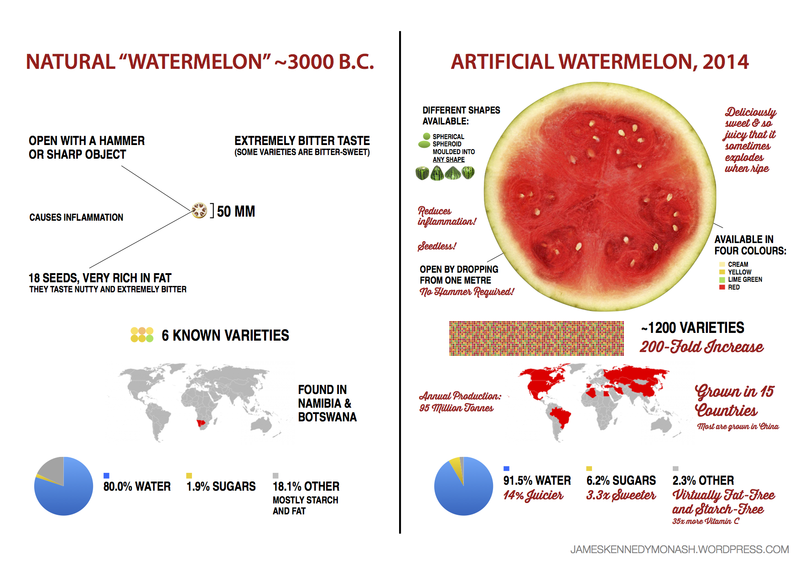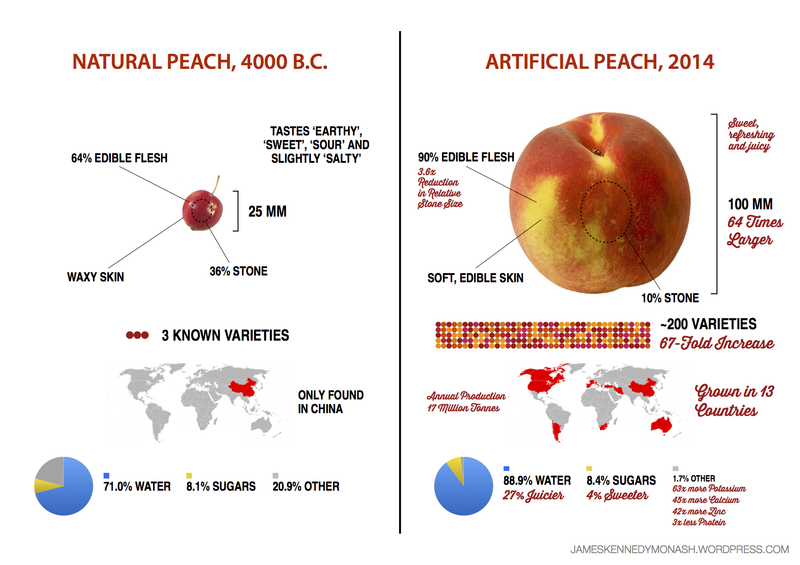9,000 Years of Selective Breeding Makes Things Delicious
May 25, 2015 4:30pm by Barry Ritholtz
This content, which contains security-related opinions and/or information, is provided for informational purposes only and should not be relied upon in any manner as professional advice, or an endorsement of any practices, products or services. There can be no guarantees or assurances that the views expressed here will be applicable for any particular facts or circumstances, and should not be relied upon in any manner. You should consult your own advisers as to legal, business, tax, and other related matters concerning any investment. The commentary in this “post” (including any related blog, podcasts, videos, and social media) reflects the personal opinions, viewpoints, and analyses of the Ritholtz Wealth Management employees providing such comments, and should not be regarded the views of Ritholtz Wealth Management LLC. or its respective affiliates or as a description of advisory services provided by Ritholtz Wealth Management or performance returns of any Ritholtz Wealth Management Investments client. References to any securities or digital assets, or performance data, are for illustrative purposes only and do not constitute an investment recommendation or offer to provide investment advisory services. Charts and graphs provided within are for informational purposes solely and should not be relied upon when making any investment decision. Past performance is not indicative of future results. The content speaks only as of the date indicated. Any projections, estimates, forecasts, targets, prospects, and/or opinions expressed in these materials are subject to change without notice and may differ or be contrary to opinions expressed by others. The Compound Media, Inc., an affiliate of Ritholtz Wealth Management, receives payment from various entities for advertisements in affiliated podcasts, blogs and emails. Inclusion of such advertisements does not constitute or imply endorsement, sponsorship or recommendation thereof, or any affiliation therewith, by the Content Creator or by Ritholtz Wealth Management or any of its employees. Investments in securities involve the risk of loss. For additional advertisement disclaimers see here: https://www.ritholtzwealth.com/advertising-disclaimers Please see disclosures here: https://ritholtzwealth.com/blog-disclosures/
What's been said:
Discussions found on the web:Posted Under
Previous Post
S&P 500: 25 Largest Companies & their Cash Holdings




Let’s not leave it at these few foods.
Almost all the foods we eat are the result of years to centuries of crossbreeding. It is Genetic Modification by slower methods.
At this point some object, “but it’s natural” meaning that GMO isn’t. I think it is no more natural one way or the other. Lettuce was a weed, crossbred beginning with the Romans. Romaine, green leaf, Boston, bibb lettuce are far from that ancient weed.
One of my favorite fruits is the Bing cherry. It was named after Ah Bing, a Chinese horticuluralist who worked for the llewelyns (Oregon, maybe Wash State), early in the 20th Century. Ah Bing developed this cherry, then with permission from the orchard owner, returned to China on a visit to his home area and family. This is still done. Mr Bing was unaware of the Exclusion Laws that forbade orientals to return to the US once they left.
The llewelyns (sp?) stood by him, and tried their best to win him reentry. But they failed. So they named the cherry after him, sort of a consolation.
This is documented in Iris Chang’s history, The Chinese in America.
And to tie things together, it is legalities that should be our concern with GMO. It changes the rights of the farmer from ownership of the seeds upon payment, to renting the seeds. Basically, Monsanto now owns our food. And this is IMO a result of patent law which was perverted long ago to ensure monopoly. See David Noble’s America by Design.
Cross breeding only works within a species or closely related species. Cross breeding cannot bring fish genes into strawberries. The secondary effects from crossing over of such inter-family and inter-kingdom crosses are completely unknown and amount to using the public as guinea pigs. When GMO’s are created so that plants can be saturated with pesticides and herbicides (Monsanto, I’m talking to YOU!), the effects of decades of ingesting those increased pesticides and herbicides is completely unknown.
Last week on SiriusXM’s “Turning back the dial” a late 1940’s commercial extolling the safety of DDT was aired. By 2090 will people be shaking their heads about Monsanto?
Anti-GMOers are throwing the baby out with the bath water.
Monsanto/Syngenta/etc. do what multinational corporations do…increase profit with no regard for externalities put upon the world around them. Of course we should be skeptical about what they are doing with their RoundUp system, engineered sterility, etc. But I see a lot of people claim they are anti-GMO spraying RoundUp on the weeds around their house. It’s apparently OK, since they don’t eat their grass, anyway. SMH
As someone with a good deal of experience in genetic engineering, it is not the consumption of a strawberry with a fish gene you should worry about. It is what the rest of the ecosystem does with that strawberry. We are just beginning to appreciate the amount of genetic exchange between species in the wild. That’s not to say we should cower in fear, just that the ecological impacts are the ones to be watching closely, not the nutritional impacts. You happily eat a twinkie, and you’re worried about fish genes in a strawberry? OK, sure.
50percent, you raise good points. It is not known that rapeseed, let us say, modified with a fish cell is harmless. But having to prove this rapeseed is harmless for now and into the future is too restrictive. When Europeans first met peanuts, nobody knew that peanuts will kill a few.
I’d compromise the certainty some want vs unrestricted let’s do it. that others want. I’d go for no harm known at present, and labeling such products as containing GMO.
So, the bottle of canola oil, or Italian dressing made with canola oil (hoo haw on that one!) that you buy, you would be clearly warned that it contains GMO. (For those who don’t know, “canola” is a marketing invented term for rapeseed oil.) That way, those allergic to rapeseed cells modified with fish cells, have a chance of protecting themselves.
I attribute it to corporate stupidity that Monsanto fights labeling.
Another point, on Roundup itself. According to the newspaper, it is causing crossbreeding among the weeds so that Roundup is increasingly ineffective. The weeds are becoming Roundup resistant, not by GMO but by natural selection.